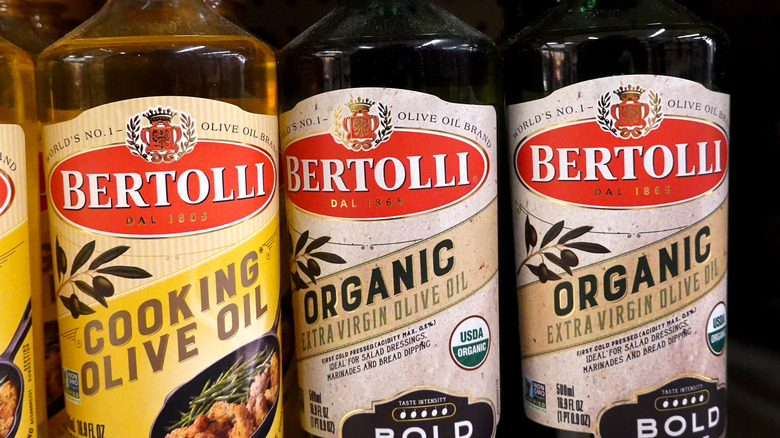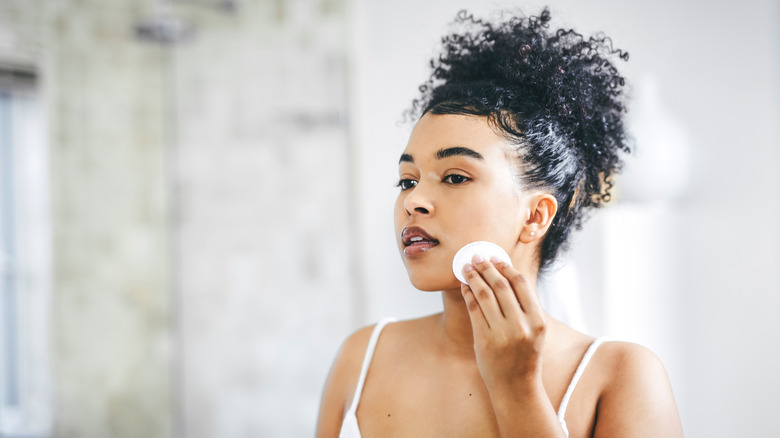Remove Your Makeup Easily With One Kitchen Staple
Between the endless amount of ingredient formulations out there, finding a makeup remover that works can be frustratingly complicated.This can be especially true if you have sensitive skin or eyes. While many of us have probably tried (and hated) more than a few makeup removers in our lives, it turns out we may have been looking in the wrong place. In fact, the perfect natural makeup remover solution might have been hiding in our kitchen this whole time: olive oil.
That's right, the same stuff you dip your bread in, add to sauces, and douse your salads with might just be the makeup remover solution you've been looking for your whole life. Even celebrities like Brie Larson,J.Lo, and Chloë Grace Moretz swear by the power of olive oil as skincare. Moretz described her struggle with skin dryness before olive oil, telling Vogue the pantry staple was "one of the first things I integrated into my face [care] and my cystic acne started clearing up within probably three to four months. What I found is that oil begets oil in a lot of ways, so when I started using olive oil it really made my skin type more neutral." Count us in. Let's explore the benefits and downsides of incorporating olive oil into your skincare routine and see if it might be a good fit for your skincare needs.
What olive oil can do for your skin
If you have oily skin, it might sound counterintuitive to add more oil to the situation. However, as Moretz told Vogue and board-certified dermatologist Dr. Ivy Lee confirmed to Insider, "'Like dissolves like' is a well-known mantra from chemistry." Olive oil can work to remove not only natural oils in our skin but can also have a similar effect on oil-based makeup and cosmetics. In the same way you should double-cleanse your beauty sponges with oil and water-based cleansers for a truly clean result, adding oil to your skincare routine can help to create a more neutral balance on your skin.
Not only is olive oil rich in vitamins (including A, D, K, and E), it is also an antioxidant. This means it can help prevent and also reverse sun damage. The best part is that incorporating olive oil into your skincare can be as simple as using a soap that contains olive oil or even using olive oil straight from the bottle in your kitchen. Saturate a cotton round with oil and gently apply it to the skin in circular motion to dissolve lipstick, cheek, and eye makeup. Then, rinse with warm water to fully remove the product.
If you decide to use straight olive oil (which can be a great moisturizer post-sunburn fyi) to remove your makeup, it's important to remove any excess by following up with a water-based cleanser. If straight olive oil is a little too much for you, there are also plenty of products that boast olive oil bases ranging from soaps to lotions to body washes. Soaps containing olive oil can be especially helpful in decreasing acne since the oil pulls double duty by killing bacteria and hydrating your skin.
Are there risks to using olive oil?
Olive oil might not be right for everyone. Studies suggest that those with highly sensitive skin or chronic skin conditions might actually find their symptoms worsen after using olive oil topically. One study specifically found that participants who utilized olive oil had noticeably damaged skin barriers which created the potential to develop and exacerbate atopic dermatitis. Another study, looking at infants, found that using oils, like olive oil, at a young age could actually contribute to the development of eczema later in life, especially if they had any family history of eczema. As always, it's important to do an allergy spot test with any new product you might be interested in before you commit to a larger part of your body.
Another potential challenge with olive oil is sourcing the right kind. When looking for an olive oil that's safe to use on your skin, it's important to stick to high-quality, all-natural oils and avoid blends and additives whenever possible. However, discerning whether something fits this criteria can be trickier than it sounds, with one study finding that 69% of imported oils failed to meet the internationally accepted standards for extra virgin olive oil. Plus, while olive oil can help fight off bacteria, it is also a relatively thick and heavy oil so there is the potential for bacteria to get trapped. This trapped bacteria can lead to clogged pores and breakouts, so making sure to use olive oil lightly (and to wipe off any extra) can be the key to getting the most from your olive oil skin care.


